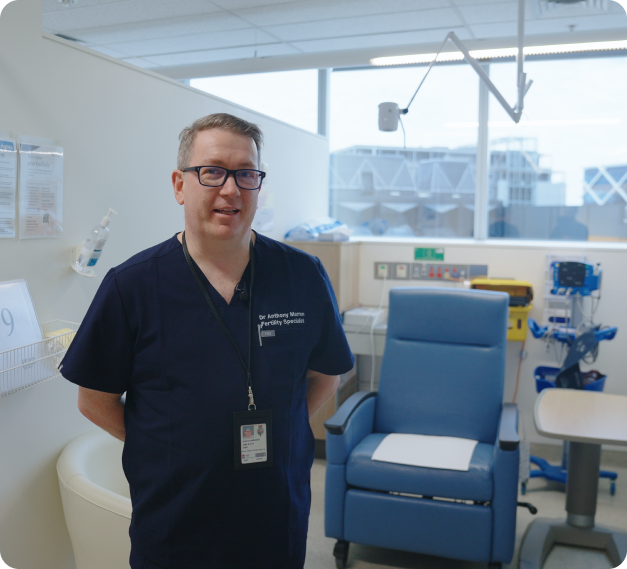
The testes are essential for male fertility and do two main things: produce sperm and produce testosterone.
In order for the testes to produce sperm and testosterone, hormonal signals from the brain need to correctly interact with the testes. The pituitary is a pea-shaped and sized gland found at the base of the brain. It releases two hormones that enable testicular function:

Disruptions in this system can lead to reduced sperm production or quality, significantly impacting a man’s ability to conceive.

In the case of testicular related infertility there could be a number of reasons why:
Sperm Production Issues: A testicular biopsy may show low sperm production, sperm maturation arrest, or no sperm production at all.
Chromosome/ genetic Conditions: Conditions such as Klinefelter Syndrome or Y Chromosome Microdeletions.
Medical Conditions: Undescended testes (cryptorchidism), testicular infections or chemotherapy-related damage to the testes.
Trauma: Injury or surgery.

Lifestyle and environmental factors can significantly influence testicular function and sperm quality:
Heat Exposure: Prolonged sitting, tight clothing, saunas, or hot baths can raise testicular temperature, impairing sperm production.
Toxins and Substances: Smoking, vaping, excessive alcohol consumption, and exposure to environmental toxins can damage sperm DNA.
Physical Activity: Both sedentary lifestyles and excessive exercise can negatively affect sperm quality.
Obesity: Hormonal imbalances caused by excess weight can lower testosterone levels and sperm quality.
Positive lifestyle changes, such as maintaining a healthy weight, avoiding smoking, and moderating alcohol intake, can improve testicular health.

Lifestyle changes can significantly improve sperm quality and overall testicular health. Key recommendations include:
In addition to correcting lifestyle factors +/- treating a varicocele, the following is suggested:
When natural conception is not possible, ART provides advanced solutions:
Men with ongoing testosterone deficiency or complex fertility issues may require specialised care from an Andrologist. This may include:
Surgery may be required to address structural issues or blockages that interfere with sperm production or transport:

If testicular issues are affecting your fertility, early diagnosis and treatment can significantly improve your chances of conception. As a specialist in male fertility, I offer advanced diagnostic and treatment options tailored to your needs.
We will go through your medical history, complete thorough investigations and perform any necessary tests and procedures to ensure you have the best chance of success towards your fertility journey.
Conditions such as varicoceles, undescended testicles, infections, and testicular trauma can impact sperm production.
Genetic conditions like Klinefelter syndrome or Y-chromosome microdeletions can lead to low sperm counts or poor sperm quality.
Yes. Smoking, excessive alcohol consumption, poor diet, and environmental toxins can negatively affect testicular function.
Semen analysis, hormone testing, and genetic screening help diagnose testicular infertility.
Treatment options include medication, lifestyle changes, surgery, and assisted reproductive technologies like ICSI.
Sperm quality may decline with age, but men can produce sperm throughout their lives.
Yes, exposure to heat, chemicals, and radiation can negatively impact sperm production.